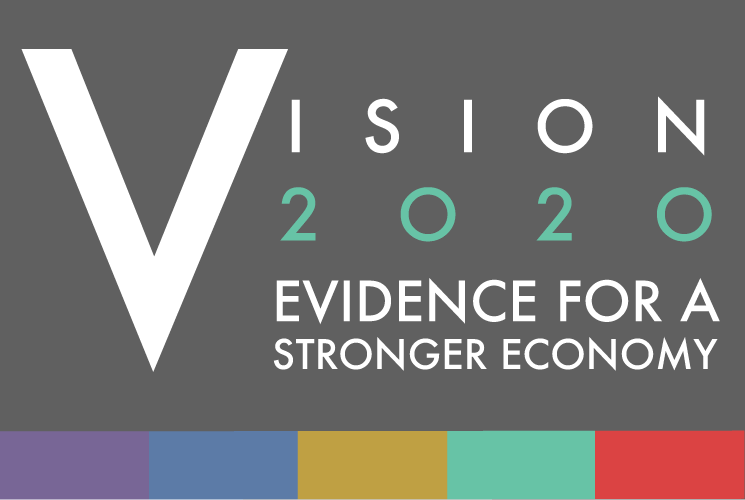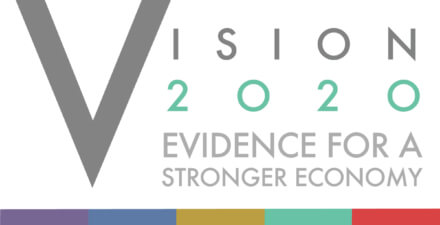Equitable Growth hosts Vision 2020 Conference in Washington, highlighting connection between economic inequality and growth

Economic inequality in the United States has grown over the past few decades to levels not seen in nearly a century. As a result, more than any presidential election in recent memory, the 2020 campaign has become an arena for debating transformative ideas to address the generational challenges of income and wealth inequality. Inequality and the need to achieve strong, broad-based economic growth are the structural problems that underlie fundamental issues from taxation to lagging wages, from healthcare and higher education to climate change and competition.
Equitable Growth is committed to providing a platform for bold policy ideas that can be adopted in 2021 by the new Congress and whoever the president might be. To help advance the conversation about these and other evidence-based policy proposals and the research behind them, Equitable Growth is hosting Vision 2020: Evidence for a Stronger Economy, an all-day conference in Washington on Friday, November 1. The event will bring together leading voices from the policymaking, academic, and advocacy communities to explore bold new ideas and discuss how the issues that candidates are debating are affected by ongoing shifts in economic thinking about how inequality obstructs, subverts, and distorts broadly shared economic growth.
Speakers will include:
- Federal Trade Commissioner Rohit Chopra, who will discuss his vision for modernizing federal antitrust power and enforcement
- Mary Kay Henry, international president of the Service Employees International Union, who will address her agenda for workers, “Unions for All,” which would, among other things, enable unions to bargain at the sectoral level
- Sarah Bloom Raskin, a Rubinstein Fellow at Duke University, a former U.S. deputy secretary of the Treasury, and a former member of the Federal Reserve System Board of Governors, who will participate in a panel on the causes and consequences of economic inequality
- Bucknell University economist Nina Banks, who will tell the story of Sadie Alexander, the first African American economist, and describe why her ideas are increasingly relevant today (Alexander, who was not able to practice economics when she received her doctorate in 1921 due to racial and gender exclusion, became, in 1945, one of the first U.S. economists to champion a federal jobs guarantee.)
- Cecilia Muñoz, former director of the White House Domestic Policy Council and current vice president for Public Interest Technology and Local Initiatives at New America, who will serve on a panel on the role of state and local stakeholders in addressing structural inequality and boosting broadly shared growth
The day’s sessions will include:
Toward a New Economy
Raskin, Dania Francis of the University of Massachusetts Amherst, and Equitable Growth President and CEO Heather Boushey will discuss the causes and consequences of economic inequality, along with bold policy solutions to tackle inequality and promote strong, sustained, and broad-based economic growth.
Macroeconomic Implications of Inequality
Harvard University economist Karen Dynan, University of California, Irvine School of Law professor Mehrsa Baradaran, and Claudia Sahm, currently a section chief at the Federal Reserve Board and soon to join Equitable Growth as its new director of macroeconomic policy, will join moderator Ylan Mui of CNBC to discuss the growing research evidence of the impact of inequality on economic growth. The panelists will discuss these findings and their implications for fiscal and monetary policymaking, as well as housing and financial regulation issues.
Envisioning a New Climate Economy
Historian Lizabeth Cohen of Harvard University will discuss what we can learn from how working Americans came to embrace President Franklin D. Roosevelt’s New Deal policies in the midst of the Great Depression, and its relevance to engaging Americans in the economic, social, and political change required by today’s climate crisis.
The Rise of Monopsony Power in the Labor Market
Equitable Growth director of Labor Market Policy and economist Kate Bahn will moderate a conversation with economist Arindrajit Dube of the University of Massachusetts Amherst and Columbia University political scientist Alexander Hertel-Fernandez about the role in the labor market of monopsony power, the ability of employers to suppress wages regardless of tightening labor supply. The panel will discuss the evidence of monopsony power and potential policies to address it.
Trust Busting in the 21st Century
The U.S. economy is increasingly dominated by a few firms. This has led to higher profits for shareholders but lower wages for workers, and has had additional impacts on innovation, entrepreneurship, and inequality. A clear consensus for how U.S. policymakers should combat concentration and anticompetitive behavior remains elusive. In this session, Federal Trade Commissioner Rohit Chopra will provide his vision for modernizing antitrust power and enforcement in a conversation with CNN reporter Brian Fung.
A Conversation About Structural Racism in the Economy
This panel, consisting of Camille Busette, director of the Race, Prosperity, and Inclusion Initiative at The Brookings Institution, Equitable Growth board member Byron Auguste, who is CEO and co-founder of Opportunity@Work, economist Monica García-Pérez of St. Cloud State University, and moderator Gillian White, deputy editor of The Atlantic, will discuss ideas for social, political, and economic policy changes to address persistent income and wealth gaps between racial groups and advance racial equity in the United States.
Fighting Power with Power: Unions for All
The history of the U.S. labor movement illustrates that unions play a critical role in mitigating inequality and empowering workers across the economy. Recent research also illustrates that an increasing proportion of nonunion workers have a desire to form a union in their workplace. In this session, Mary Kay Henry will address her agenda for workers, “Unions for All.”
The Front Line of Structural Change
Joining Muñoz in a conversation about the economics of place and race, with a focus on the role of state and local stakeholders will be Tom Perriello, executive director of Open Society-US, Maya Rockeymoore Cummings, president and CEO of Global Policy Solutions and chair of the Maryland Democratic Party, economist Bradley Hardy of American University, and moderator Anmol Chaddha, research director for the Equitable Futures Lab at the Institute for the Future.
Building Worker Power
Carmen Rojas, co-founder and CEO of The Workers Lab, will close out the event with a discussion of promising new strategies for building worker power, particularly for low-income workers, in today’s changing economy.
Equitable Growth is planning a number of other actions in the coming months to inform the 2020 policy conversation. Stay tuned!







